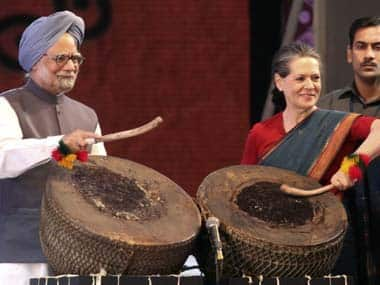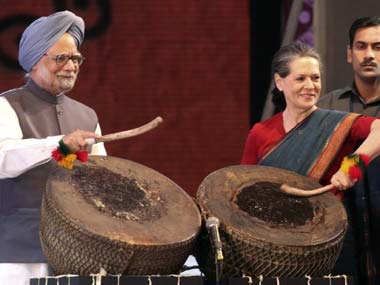How did “ Sonia’s poodle ,” an “ Underachiever ” in UPA-2, and who looked likely to become a “ tragic figure ” in Indian politics, suddenly metamorphose into Tiger Manmohan on Big Bang Friday - the day the UPA government opened the sluice gates to major reforms?
There are currently more questions than answers. Is this Manmohan Singh’s N-deal moment in UPA-2? Have Sonia and Rahul suddenly come on board on the need for reform? Is the Congress suddenly ready to call its allies’ bluff, or even face the electorate? How did the Union cabinet suddenly discover it had a spine?
Was Big Bang Friday a sign of the UPA’s political savvy or political desperation?
There may be no single answer, but the political reasons could include a mix of personal and political answers. Among them: the foreign media’s criticism has begun to bite (Indian politicians are more sensitive to a Washington Post article than a Caravan analysis that originally painted Manmohan Singh as a “tragic figure”); The Sonia-Rahul dynastic duo may also have realised that if they allowed Manmohan to sink, their fortunes may also go down with it, thanks to the myriad scams surrounding UPA-2. (But the old deniability on unpopular decisions remains: Rahul Gandhi had no reaction to the diesel price hike).
Moreover, with Parliament adjourned and two state assembly elections coming up in November (Gujarat and Himachal), there could also have been the political calculation that none of the UPA allies may be willing to rock the boat till the winter session. By then who knows what the political situation would be? UPA thus used the small window of opportunity to get some things done in its own interest.
[caption id=“attachment_456887” align=“alignleft” width=“380”]
 Was Big Bang Friday a sign of the UPA’s political savvy or political desperation?Reuters[/caption]
Was Big Bang Friday a sign of the UPA’s political savvy or political desperation?Reuters[/caption]
There is also the possibility that the initial muted response to the diesel price hike - both by Mulayam Singh and Mamata Banerjee - gave Congress a chance to roll the dice further and go the whole hog, opening up foreign direct investment (FDI) in multi-brand retail, aviation, broadcasting services, and power exchanges, apart from disinvestment.
Impact Shorts
More ShortsWe will never know the real answers to political questions, since these are generally not discussed in public, but the decisions themselves offer clues to what the thinking could have been - and why some of them are actually indicative of political self-interest and crony capitalism at work rather than merely a desire to take reforms to the next level.
In all probability, these are defensive reforms, not reforms really intended to change the way business is done here and genuinely revive the India Growth Story. The timing indicates why these were done now rather than earlier or later.
Here’s how one should read the underlying reasons for Big Bang Friday’s reforms.
FDI in aviation: This is the clearest pointer to crony capitalism. The sad state of Kingfisher Airlines is the obvious justification, but who will buy a sinking airline with over Rs 7,000 crore in debt and an equal amount in accumulated losses? Kingfisher could have been saved if FDI had come last year.
FDI in aviation was not something any UPA ally would have opposed - at least not enough to pull the plug on the government. However, the reason why it did not happen earlier and has happened now is obvious: if FDI had been allowed last year, Kingfisher could have survived, and its rivals would have been unable to raise fares and become viable. Much behind-the-scenes lobbying must have happened to delay the inevitable so that Kingfisher was not saved.
Now that FDI is allowed and Kingfisher won’t benefit much, the real beneficiaries will be the recently revived SpiceJet and GoAir, not to speak of Jet Airways.
Sure, FDI in aviation is reform. And much needed. But it was deliberately delayed for no reason at all.
The diesel price hike: On the face of it, the diesel price revision was long overdue - and probably the only one dictated by pure economics and not politics. The obvious reason is the huge subsidy bill, that could have crossed Rs 2,00,000 crore in 2012-13 and busted the Union budget. However, there are wheels within wheels here, too.
First, the diesel hike was impossible to avoid since the alternative was to tax diesel cars. The lobby against this was simply overwhelming, and includes almost all the biggies - from the Tatas to the Mahindras to many foreign carmakers, all diesel kings (barring Maruti).
Secondly, the diesel price hike is not Rs 5 a litre, but only Rs 3.50 a litre - the balance is an additional tax on diesel, which goes back to the government. And this tax is intended to compensate for the Rs 5.30 per litre cut in petrol duties. This is where the political intent in clear. The last time the UPA allowed petrol prices to rise, Mamata Banerjee threatened mayhem. This time the government has quietly tried to balance the diesel red rag for Mamata with the petrol palliative. Whether this works is another matter altogether. Maybe the Lady is not for turning.
Thirdly, the diesel hike is actually the finance minister’s overt signal to the Reserve Bank of India (RBI) to cut rates. The big schism in the macroeconomy is that the RBI has been refusing to ease rates without the government doing its part to fix the big hole in the budget. The diesel rate hike was the minimum needed to get the RBI to act. It probably did not come from any genuine UPA conviction on the need for deregulating petroleum prices - which has not effectively happened even in petrol, where the government keeps deciding when oil companies should raise prices even though it is decontrolled.
FDI in retail: This is the most enigmatic decision of the UPA. It is both bold and probably least needed, given the potential for a political storm. The fact is Big Retail scares the daylights out of many politicians since small kirana stores running into millions are a strong political force in many states. Even Reliance Retail faced opposition in states like Uttar Pradesh, so Wal-Mart is not going to have an easy ride.
The question is: why did the UPA do this when the benefits, if any, will be long in coming? Setting up cold chains and sourcing produce from thousands of farmers and vendors is not going to happen overnight. Even states that back big retail - like Punjab, which sees farmers benefiting from the improving efficiencies of big retail - will find that the benefits will not come immediately.
What Big Retail does is eliminate middlemen in the supply chain. But the net gains accrue more to the retailer (and consumers) than producers. As Yogi Aggarwal wrote in Firstpost, quoting a Mint article by Himanshu of the JNU: “One of the studies commissioned by the US Congress in 2008 was on the linkage between farm gate and retail prices. The average value of farm share (the share of total retail price received by farmers) declined from 41 percent in the 1950s to around 35 percent in the 1970s, and then declined sharply after the 1980s to only 18.5 percent in 2006…. For the record, an Indian farmer gets anywhere between 60 percent and 70 percent of the retail price for rice and wheat. The percentage varies, but it is upwards of 50 percent for most of food items, including eggs and poultry.”
In India, cooperatives like Amul and Mother Dairy have done more to eliminate middlemen than Big Retail.
If farmers are going to get only a small increase in benefits, why did our politicians bite the bullet on FDI in multi-brand retail?
The answer relates to narrow self-interest, and helping cronies out. Consider who will benefit first.
One, the big Indian retail companies like Pantaloons (Big Bazaar, Food Bazaar) are overleveraged and drowning in debt. Allowing FDI in retail will enable these companies to reduce debts by selling stakes to the Wal-Marts of the world. Subhiksha went under due to debt. In recent months, Kishore Biyani of Future Group has sold stakes in Pantaloons (the garments part) and Future Capital to raise money and reduce debt. Other retailers with high debts too will be happy for foreign capital. FDI is thus a partial bailout for Indian Big Retail.
Two, banks are fretting about high exposures to Indian retailers. Allowing FDI will enable them to rescue their loans from turning into non-performing assets. Since most of these banks are public sector ones, it is a benefit to P Chidambaram’s fiscal deficit efforts too.
Three, FDI in retail - currently restricted to big cities - means commercial real estate will start stabilising in prices. While actual investment in malls and stores may be some years away, there is little doubt that FDI is required to lift sentiment in the depressed realty markets of the big cities. Not to forget: politicians are often the biggest benami owners of retail assets. And in election years, these assets have to be encashed to finance re-elections. FDI will bail some of them out too.
Four, the only way Chidambaram can raise revenues is by selling household silver like public sector shares when tax revenues are weak and the economy is into a cyclical slowdown. But this can’t happen if market sentiment is weak. FDI in retail is a huge sentiment booster, since it not only rescues Indian retailers from debt, but also boosts bankers and, more importantly, makes foreign investors more interested in Indian stocks. (President Obama, for example, battled for Wal-Mart). Chidambaram cannot even begin his fiscal correction with more disinvestment - and only FDI in retail can help.
The rest of the reforms - allowing FDI in broadcasting services, but not media, and power exchanges - were probably done to show a high level of action. Their impact will benefit a few businesses, and not make a huge difference to our lives. (For example, how will FDI in power trading and exchanges provide a solution to the power industry’s real problems of unremunerative tariffs, theft of power and losses in transmission, the losses of state electricity boards (now over Rs 2,00,000 crore), the coal shortage, and related issues?
The reforms of Big Bang Friday are all important for the economy, but they are as much driven by the short-term self-interest of UPA politicians, big industry and bankers as by the need for big ticket reforms.
The reason why the reforms will not do much ultimately is this: to make FDI in retail work, you have to make Indian industry itself more competitive, or else the Wal-Marts will be importing Chinese goods to sell in domestic stores.
But every other UPA legislation is about increasing costs for Indian industry - from telecom spectrum to coal auctions to the land and mining bills. Worse, the only way to create more jobs to replace the ones lost by kirana stores will be to have more flexible labour laws - so that industry and service sector companies employ more people.
Without all these changes, Big Bang Friday will end up as a Whimper.
)